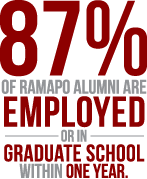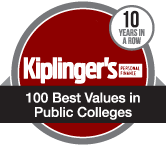College Catalog: 2015-2016
Salameno School of Humanities and Global Studies (SSHGS): Literature (B.A.)
Website: Salameno School of Humanities and Global Studies
Concentration: Creative Writing.
Conveners:
Faculty:
Faculty:
- Yvette Kisor
- Anthony Padovano
- Peter Scheckner
- Hugh Sheehy
- Frances Shapiro-Skrobe
- Paula Straile-Costa
- Lisa Williams
- Current as of September 2015
The Literature Major at Ramapo College: Read your world, Write your life.
Literature majors go on to many exciting careers. Many literature students prepare for these careers with internships, co-ops, and service learning placements. Here, students make valuable connections in the community and the professional world. Literature is, of course, excellent preparation for teaching on the elementary or secondary levels; however, teaching is by no means the only opportunity a literature degree offers. Literature graduates do well in business, government, and even science, where articulate and creative expression is valued. Our students have gone on to careers in publishing, writing, journalism, and library sciences. Literature provides training for law, diplomacy, and public relations. Visit our Success Stories page and meet some of our graduates and current students:
https://www.ramapo.edu/major-literature/success-stories/.
Literature Majors become thoughtful, informed citizens who engage their imaginations through the study of literary texts from around the world and across history. They develop the critical thinking, reading, research, and writing skills essential for success in our increasingly interconnected and changing world. The Major prepares students for the working world, but also for life’s other challenges.
The program balances survey and seminar, American, British, and world literature. Students study genre, period, and theme; they develop skills in reading, criticism, and creative writing. Courses emphasize the interdisciplinary and multicultural dimensions of literature and life. They fire the imagination while preparing students for careers or graduate education.
Student creativity is central to the Literature program. Students may either minor or concentrate in Creative Writing. Our students also edit Trillium, the college literary magazine. Our student organizations (the Literature Club and the Omega Omega Chapter of the national English Honor Society) are among the most engaged and successful on campus. The faculty advisor to the yearbook, The Arch, has long been a member of the Literature faculty.
Literature is central to the College’s liberal arts mission, at the very heart of its focus on interdisciplinarity, multiculturalism, and global connection. Literature takes in the entire world, and fosters the development of an enlightened and critical citizen of the world.
The major is offered by the Salameno School of Humanities and Global Studies and leads to a B.A. degree. The Literature Program also offers two minors: Literature or Creative Writing. Some Literature Majors choose to pursue a concentration in Creative Writing. Please visit https://www.ramapo.edu/major-literature/ to learn more about he major, minor, and concentration.
Goal 1: Practice close reading:
“Close reading” includes but is not limited to reading literary texts to identify and interpret word choices such as inferences, ambiguity, and figurative language.
Goal 2: Perform literary research:
“Literary research” includes but is not limited to using primary, secondary, and visual source materials, accessed in various ways, including electronic databases.
Goal 3: Write well and creatively.
“Write well and creatively” includes but is not limited to demonstrating the ability to develop and support forceful, complex theses which acknowledge counterarguments and use a vocabulary of literary terms.
“Write well and creatively” includes but is not limited to demonstrating the ability to write formally complete works within a genre (fiction, creative nonfiction, poetry).
Goal 4: Demonstrate understanding of the interconnectedness of authors, literary traditions, and forms.
“Interconnectedness” includes but is not limited to connections across time, culture, and national and linguistic boundaries.
Goal 5: Understand literature in an interdisciplinary fashion.
“Understand literature in an interdisciplinary fashion” includes but is not limited to studying Literature to think creatively about problems within and beyond literary studies.
Goal 6: Understand that Literature develops over distinct periods.
“Understanding that Literature develops over distinct periods” includes but is not limited to analyzing this development and periods using different theoretical approaches.
- Students take 12 courses (48 credits) to complete the major.
- Transfer students who have 48 or more credits accepted at the time of transfer are waived from the courses marked with a (W) below. Waivers only apply to General Education Requirements NOT School Core or Major Requirements.
- Double counting between General Education, School Core, and Major may be possible. Check with your advisor.
- Writing Intensive Requirement (six courses): three writing intensive courses in the general education curriculum are required: First Year Seminar, Critical Reading and Writing, and Readings in the Humanities; the other three courses are taken in the major.
- Not all courses are offered each semester. Please check the current Schedule of Classes for semester course offerings.
LITERATURE MAJOR
- Subject & Course # – Title & Course Description
- GENERAL EDUCATION REQUIREMENTS
- SELECT ONE – (W) BADM 115 - PERSPECTIVES OF BUSINESS AND SOCIETY OR
- (W) SOSC 101 - SOCIAL ISSUES
- CRWT 102 - CRITICAL READING AND WRITING II
- AIID 201 - READINGS IN THE HUMANITIES (W)
- SELECT ONE – (W) GE-HISTORY CATEGORY: HIST 101-110
- SELECT ONE – GE-MATHEMATICS CATEGORY: MATH 101-121
- SELECT ONE – GE-SCIENCE WITH EXPERIENTIAL COMPONENT CATEGORY
- SELECT ONE – GE-INTERCULTURAL NORTH AMERICA CATEGORY
- SELECT ONE – GE-INTERNATIONAL ISSUES CATEGORY
- SELECT ONE – (W) GE-TOPICS SOCIAL SCIENCE CATEGORY
- Salameno School of Humanities and Global Studies REQUIREMENTS
- AIID 101 - FIRST YEAR TOPICS: LIBERAL STUDIES (W)
- FOUNDATIONS I AND
FOUNDATIONS II AND
INTERMEDIATE I OR
PROFICIENCY TEST
(SEE SSHGS WORLD LANGUAGE REQUIREMENT) - LITERATURE MAJOR REQUIREMENTS
- LITR 201 - READINGS IN POETRY
- LITR 203 - METHODS OF LITERARY STUDY
- LITR 240 - SURVEY OF BRITISH LITERATURE: ANGLO-SAXON PERIOD TO EIGHTEENTH CENTURY
- SIX CATEGORY COURSES 200/300 LEVEL – selected from the following categories (three must be at 300 level)
- AMERICAN LITERATURE: SELECT ONE
- LITR 220 - SURVEY OF AMERICAN LITERATURE: PRE-COLUMBIAN TO ROMANTIC
- LITR 221 - SURVEY OF AMERICAN LITERATURE: ROMANTIC TO CONTEMPORARY
- LITR 223 - SURVEY OF AMERICAN POETRY
- LITR 224 - AMERICAN DRAMA
- LITR 226 - AMERICAN SHORT STORY
- LITR 228 - COLONIAL AMERICAN LITERATURE
- LITR 230 - 19TH CENTURY AMERICAN LITERATURE
- LITR 231 - 19TH CENTURY AMERICAN WOMEN AUTHORS
- LITR 232 - 20TH CENTURY AMERICAN NOVEL
- LITR 233 - HARLEM RENAISSANCE
- LITR 234 - CONTEMPORARY AMERICAN LITERATURE
- LITR 235 - AFRICAN AMERICAN LITERATURE
- LITR 236 - MULTICULTURAL LITERATURE
- LITR 237 - IRISH AMERICAN LITERATURE
- LITR 320 - COMIC AMERICAN NOVEL
- LITR 326 - AMERICAN ROMANTICISM
- LITR 332 - SOUTHERN AMERICAN WRITERS
- LITR 334 - AFRICAN AMERICAN WOMEN WRITERS
- LITR 338 - LATINO LITERATURE OF THE USA
- DRAMA: SELECT ONE
- LITR 224 - AMERICAN DRAMA
- LITR 244 - SHAKESPEARE'S PLAYS
- LITR 264 - SURVEY OF WORLD DRAMA
- LITR 268 - SURVEY OF GREEK DRAMA
- LITR 272 - MODERN EUROPEAN DRAMA
- INTERNATIONAL LITERATURE: SELECT ONE
- LITR 252 - MODERN IRISH LITERATURE
- LITR 260 - WORLD MYTHOLOGY
- LITR 263 - SURVEY OF SCIENCE FICTION
- LITR 264 - SURVEY OF WORLD DRAMA
- LITR 265 - THE HEBREW BIBLE
- LITR 266 - THE CHRISTIAN BIBLE
- LITR 268 - SURVEY OF GREEK DRAMA
- LITR 269 - LITERATURE OF THE MIDDLE AGES
- LITR 270 - SURVEY OF EUROPEAN LITERATURE
- LITR 271 - EUROPEAN SHORT STORY
- LITR 272 - MODERN EUROPEAN DRAMA
- LITR 273 - MODERN NOVEL IN FRANCE
- LITR 274 - RUSSIAN LITERATURE & CULTURE
- LITR 275 - SURVEY OF LATIN AMERICAN LITERATURE
- LITR 276 - LITERATURE OF THE AMERICAS
- LITR 277 - SURVEY OF AFRICAN LITERATURE
- LITR 279 - THE GRAPHIC NARRATIVE
- LITR 310 - EXISTENTIALISM
- LITR 312 - COMPARATIVE FEMINIST THEORIES
- LITR 362 - INTERNATIONAL 19TH CENTURY NOVEL
- LITR 363 - INTERNATIONAL 20TH & 21ST CENTURY NOVEL
- LITR 366 - LITERATURE OF THE HOLOCAUST
- LITR 368 - ITALIAN RENAISSANCE STUDY
- LITR 370 - CONTEMPORARY ITALIAN LITERATURE
- LITR 372 - SPANISH LITERATURE OF THE GOLDEN AGE
- LITR 374 - WORLD LITERATURE AND THE ENVIRONMENT
- LITR 376 - BRAZILIAN LITERATURE & CULTURE
- LITR 378 - BLACK ODYSSEY
- LITERATURE WRITTEN BEFORE 1800: SELECT ONE
- LITR 228 - COLONIAL AMERICAN LITERATURE
- LITR 244 - SHAKESPEARE'S PLAYS
- LITR 260 - WORLD MYTHOLOGY
- LITR 265 - THE HEBREW BIBLE
- LITR 266 - THE CHRISTIAN BIBLE
- LITR 268 - SURVEY OF GREEK DRAMA
- LITR 269 - LITERATURE OF THE MIDDLE AGES
- LITR 340 - BRITISH MEDIEVAL LITERATURE
- LITR 354 - THE MEDIEVAL AND MODERN IN TOLKIEN'S MIDDLE-EARTH
- LITR 368 - ITALIAN RENAISSANCE STUDY
- LITR 372 - SPANISH LITERATURE OF THE GOLDEN AGE
- THEORY AND PROCESS OF LANGUAGE: SELECT ONE
- LITR 202 - MAGAZINE WORKSHOP
- LITR 280 - INTRODUCTION TO CREATIVE WRITING
- LITR 302 - GRAMMAR: THEORY AND PEDAGOGY
- LITR 304 - HISTORY OF THE ENGLISH LANGUAGE
- LITR 306 - LITERATURE:THEORY & CRITICISM
- LITR 312 - COMPARATIVE FEMINIST THEORIES
- LITR 381 - CREATIVE WRITING CAPSTONE
- AUTHOR STUDIES: SELECT ONE
- LITR 319 - AUTHOR STUDIES
- LITERATURE ELECTIVES: SELECT TWO (with Literature advisor)
- LITERATURE CAPSTONE COURSE:
- LITR 414 - SEMINAR: OR
- directed readings and research
- CREATIVE WRITING CONCENTRATION
(The creative Writing concentration is only available to those majoring in Literature.) - REQUIRED:
- LITR 280 - INTRODUCTION TO CREATIVE WRITING
- SELECT TWO:
- LITR 282 - FICTION WRITING WORKSHOP
- LITR 283 - POETRY WRITING WORKSHOP
- LITR 284 - PERSONAL ESSAY: CREATIVE WRITING WORKSHOP
- Note: Any creative writing course offered in Communication Arts can substitute for one of these courses with convener’s approval.
- CREATIVE WRITING CAPSTONE REQUIREMENT:
- LITR 381 - CREATIVE WRITING CAPSTONE
- With careful planning, students can complete the Literature Major and the Creative Writing Concentration with 13 courses. LITR-280 or LITR-381 can fulfill a Literature Major’s “Theory and Process of Language” requirement. All Literature Majors must take 2 literature electives. Taking two creative writing courses for these electives facilitates faster completion of the major and concentration. Finally, the Creative Writing Capstone would be a student’s 13th course.
- Please consult your literature advisor.
Note: A 2.0 GPA in the major is required for graduation.
- Students are required to take 5 courses (20 credits) to complete the minor.
- At least 1/2 of the courses fulfilling a minor must be distinct from the student’s major. That is, three of the five courses required for a minor cannot be used towards fulfillment of major requirements. A school core does not need to be completed for a minor. Minors are open to students regardless of school affiliation.
LITERATURE MINOR
- Subject & Course # – Title & Course Description
- REQUIRED:
- LITR 203 - METHODS OF LITERARY STUDY
- LITERATURE ELECTIVES: SELECT FOUR MORE LITR COURSES (one at 300 level)
- Students are required to take 5 courses (20 credits) to complete this minor.
- At least 1/2 of the courses fulfilling a minor must be distinct from the student’s major. That is, three of the five courses required for a minor are not used towards fulfillment of major requirements. A school core does not need to be completed for a minor.
As is the case with the study of any art, the studio experience enhances the scholarly experience. In order to complement the scholarly study of Literature for students majoring in other areas, the Literature program offers a minor in Creative Writing. The minor provides students the opportunity to explore the discipline of Literature by focusing on the production of literary works with courses in poetry, fiction and creative nonfiction. By creating literature, students are asked to embody and express the formal, aesthetic and thematic concerns that we share with the scholarly aspects of literary study. Additionally, the Creative Writing minor fosters the knowledge and talents of students who have demonstrated promise as writers and allows others to find talents they did not know they had.
A focused curricular and co-curricular experience, the Creative Writing minor is available for students majoring in areas other than Literature. For students majoring in Literature a concentration in Creative Writing is available. The Literature Program invites you to join our community of writers.
CREATIVE WRITING MINOR
- Subject & Course # – Title & Course Description
- CREATIVE WRITING MINOR REQUIREMENTS (5 COURSES)
- REQUIRED INTRODUCTORY COURSE:
- LITR 280 - INTRODUCTION TO CREATIVE WRITING
- WRITING WORKSHOPS: SELECT ONE
- LITR 282 - FICTION WRITING WORKSHOP
- LITR 283 - POETRY WRITING WORKSHOP
- LITR 284 - PERSONAL ESSAY: CREATIVE WRITING WORKSHOP
- CAPSTONE COURSE (required):
- LITR 381 - CREATIVE WRITING CAPSTONE
- POETRY: SELECT ONE
- LITR 201 - READINGS IN POETRY
- LITR 223 - SURVEY OF AMERICAN POETRY
- LITR 314 - TRANSATLANTIC 19TH CENTURY POETRY
- LITR 346 - ENGLISH ROMANTIC POETS
- PROSE: SELECT ONE
- LITR 220 - SURVEY OF AMERICAN LITERATURE: PRE-COLUMBIAN TO ROMANTIC
- LITR 221 - SURVEY OF AMERICAN LITERATURE: ROMANTIC TO CONTEMPORARY
- LITR 226 - AMERICAN SHORT STORY
- LITR 231 - 19TH CENTURY AMERICAN WOMEN AUTHORS
- LITR 232 - 20TH CENTURY AMERICAN NOVEL
- LITR 234 - CONTEMPORARY AMERICAN LITERATURE
- LITR 273 - MODERN NOVEL IN FRANCE
- LITR 275 - SURVEY OF LATIN AMERICAN LITERATURE
- LITR 276 - LITERATURE OF THE AMERICAS
- LITR 334 - AFRICAN AMERICAN WOMEN WRITERS
In some circumstances, another course can be substituted for one of the above courses. See the convener.
Note: A 2.0 GPA in the major is required for graduation.
General Education Requirements
Four Year Plan
Graduation Requirements
Literature Major Website
Salameno School of Humanities and Global Studies Website
Faculty Profiles






